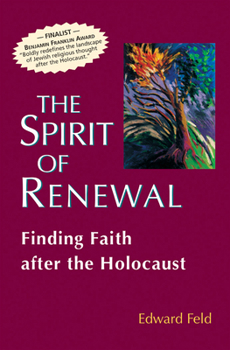Spirit of Renewal
Select Format
Select Condition 
Book Overview
Helps the modern reader understand events that span almost 4,000 years of the history of Judaism and the Jewish people. This profound and engaging meditation opens the way to a powerful new understanding of the nature of God and the spiritual life.
Format:Paperback
Language:English
ISBN:1879045400
ISBN13:9781879045408
Release Date:February 1995
Publisher:Jewish Lights Publishing
Length:224 Pages
Weight:0.75 lbs.
Dimensions:0.6" x 5.8" x 8.7"
Customer Reviews
1 rating
Life After Death
Published by Thriftbooks.com User , 24 years ago
Edward Feld's stirring book is an example of creative religious thinking for this new century basing itself on historical precedents, personal experience and contemporary theological insights. He is part of a generation that grew up with or immediately following the Holocaust and which sought to reclaim a spiritual life in the wake of the destruction of European Jewry. I am eight years younger than Rabbi Feld. His book resonated with me because we have many of the same generational experiences and yearnings. I took it with me when I escorted teenagers on the March of the Living and found that it provided a religious outlook which mirrored mine and enabled me to help frame both the Holocaust and the lived reality of the State of Israel for teenagers who would accept no false notes as they grappled with the core events of Jewish life in the 20th century.Feld traces a number of historical precedents to the radical evil of the Holocaust and examines the historical responses of previous generations to those events. Genesis, Job and Isaiah form the touchstones of Feld's exploration of Biblical theodocy. The loss of the Temple, the despair of that primary generation, subsequent responses of martyrdom and a rejection of this world and ultimately the replacement of history by timeless Torah are described by Feld as creating a theological paradigm which would persist and characterize Jewish life in subsequent centuries. If the Biblical responses to evil represent the early stage of Jewish theodocy and the rabbinic reactions form the "middle ages" of such a theology, the horror of the Holocaust and the miracle of the birth and continued existence of the State of Israel become the watershed of modernity.Feld rejects any simple effort to find meaning in the Shoah. I recall standing at the ashes of the crematoria with children of survivors who rejected the pablum offered them as an "explanation" of the Holocaust. Feld details the descent into hell and the effort to strip the Jew of both life and meaning. This leads to a radical critique of Jewish life and the notion of divine providence. He focuses on human efforts to remain faithful to life, what Fackenheim calls "kiddush hahayyim." That becomes the critical part of the rebuilding of a measure of faith after the Shoah. Rather like the rejection of Western civilization by Eliezer Berkovits, Feld sees our ideas of what humanity can be as transformed by the Holocaust - both for woe and for weal. Like most post-Holocaust thinkers, Feld is drawn away from the image of a transcendent God whose power and providence are everywhere to a more modest conception of God who is to be discovered in the small acts of those who clung to their ideals despite all efforts to degrade and dehumanize them. These acts are the "signs of transcendence" of which Peter Berger writes. Additionally, this returns Jewish life to a concern with history and away from an otherwordly orientation. The bi






